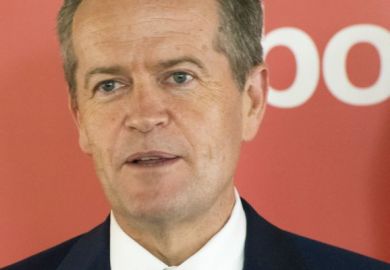The vice-chancellor of the University of Oxford has signalled her intention to reform the institution’s “sclerotic” administrative structures, warning that Oxford otherwise faces “slow but definite decline”.
In her annual oration, Louise Richardson said that “much of the success” of Oxford “can be attributed to its devolved structure”, but she expressed concern that the number of functions carried out at college or departmental level “allows for a great deal of duplication of activities”, wasting both money and time.
Attempts to centralise functions at Oxford can be controversial, and the autonomy of colleges is fiercely defended, so Professor Richardson will want to avoid the sort of unrest over governance that marred the vice-chancellorship of John Hood between 2003 and 2009.
In her address, Professor Richardson said that the question she had asked herself most often since taking over as vice-chancellor in January 2016 was how Oxford maintained its success “when we organise ourselves in this sclerotic way” and when staff spend so much time “on things that are so far removed from what brought us here to begin with”.
She said, for example, that it took 32 minutes to process a straightforward expenses claim for a £10 taxi trip at Oxford because paper forms are used and multiple checks are made by staff at departmental and central levels. More complex claims can take twice as long, and it has been estimated that processing the university’s expenses claims consumes resources equivalent to 30 full-time staff members each year.
Highlighting the administrative sprawl, Professor Richardson said that only 15 per cent of Oxford’s 275 human resources staff were based centrally, while just 40 per cent of IT staff were in the IT department.
She argued that there “must be many more opportunities for greater efficiency, better coordination and sharing of back-office activities”.
“We all know that change occurs slowly at Oxford,” Professor Richardson warned. “But the world is changing rapidly around us, and I believe that if we stand still we will enter a period of slow but definite decline.”
She said that an initiative, One Oxford, would be aimed at “recasting and simplifying service delivery”, in order “to ensure that we remain one of the world’s pre-eminent universities by allowing all of us to focus our resources on the activities we care about most, the research and teaching which are, and always have been, the central mission of this great university”.
Gill Evans, emeritus professor of medieval theology at the University of Cambridge, said that dons would be concerned about any reforms that were perceived to erode academic self-governance or college autonomy.
“‘Sclerotic’ has been a familiar criticism, but attempts at governance change have never so far prised the fingers of Oxbridge academics from their previous freedom to govern themselves. After all, it works,” Professor Evans said.
But David Palfreyman, bursar of New College, Oxford, said that Professor Richardson’s proposals looked like “sensible tinkering to get welcome efficiency gains”.
“Nobody can possibly object to the streamlining of routine administration to save money that can far more usefully be spent at the chalkface in our teaching of undergraduates paying £9,250 per annum or in support of our ‘number one university’ global research brand,” Mr Palfreyman said.
In the oration, Professor Richardson also urged opponents of Oxford’s policy requiring academics to retire at the age of 68 to “abide by the expressed preference of their colleagues”, who voted to back the rules six times last year.
Register to continue
Why register?
- Registration is free and only takes a moment
- Once registered, you can read 3 articles a month
- Sign up for our newsletter
Subscribe
Or subscribe for unlimited access to:
- Unlimited access to news, views, insights & reviews
- Digital editions
- Digital access to THE’s university and college rankings analysis
Already registered or a current subscriber? Login






